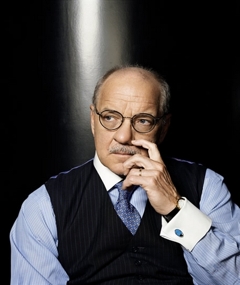|
|
| Schrader, Paul
 |
Birth name
Paul Joseph Schrader
Date of birth
22 July 1946, Grand Rapids, Michigan, U.S.
Mini biography
Paul Schrader (July 22, 1946, Grand Rapids, Michigan, U.S.)
Raised in a strict religious household in Michigan, writer/director Paul Schrader studied theology at Calvin College and didn’t see a movie until he was in his late teens.
His stern background would fuel many of the themes throughout his career: downbeat stories of characters who violently break down in oppressive situations.
Transfixed by the cinema and encouraged by critic Pauline Kael, he moved to Los Angeles and became a film scholar at U.C.L.A.
He wrote movie reviews for newspapers, edited the magazine Cinema, and wrote the highly influential critical essay “The Trancendental Style: Ozu, Bresson, Dryer.”
After a period of heavy drinking and serious depression, he sold his first screenplay, The Yakuza, a Japanese thriller co-written with his brother, Leonard, and Robert Towne.
The next year, Schrader wrote Taxi Driver, the grim tale of urban alienation. Taxi Driver started his successful collaborative relationship with director Martin Scorsese, another so-called “film school brat” who was also raised in a religious household.
“What fascinates me are people who want to be one thing but who behave in a way contradictory to that. Who might say, ‘I want to be happy, but I keep doing things that make me unhappy.”

After writing the screenplays for Obsession and Rolling Thunder, Schrader made his directorial debut with Blue Collar in 1978, a forceful exposé about auto workers.
The following year he directed Hardcore, a poorly received but shocking account of a Midwestern girl escaping her family for a porno career in L.A.
He would continue to explore the seedy underbelly of the sex industry in American Gigolo, a glossier look at another troubled hero that gained Schrader some attention.
He teamed up with Scorsese for the second time with the emotionally brutal Raging Bull, one of the most acclaimed American films of the ‘80s, and a good example of Schrader’s reoccurring destructive male protagonists suffering from violent desperation.
This high point in his career was followed by a sporadic period during which he returned to evocative sexual themes with the remake of Cat People and won a Cannes prize for Mishima.
Never ceasing to address controversial subject matter, he scripted The Last Temptation of Christ in his third collaboration with Scorsese, and then went on to write Patty Hearst, based upon the real-life terrorist-kidnapping plot.
Light Sleeper, which he wrote and directed in 1992, can be thought of as the last entry in a trilogy of films — together with Taxi Driver and American Gigolo — investigating self-destructive urban loners driven to near madness.
For many of his other directorial projects in the ‘90s, Schrader turned to literature adaptations.
The Comfort of Strangers was based upon the Ian McEwan novel , Touch, on an Elmore Leonard novel, and Affliction, on a Russell Banks novel.
The latter enjoyed critical success for Schrader’s abilities, in addition to a Best Supporting Actor Oscar for James Coburn.
Unfortunately, the writer’s fourth pairing with Scorsese for Bringing out the Dead did not do as well as hoped, compared with their triumphs in the past.
After writing and directing Forever Mine, which debuted on cable, Schrader switched gears and worked only as a director for Auto Focus in 2002.
This dark biopic of television star Bob Crane combines his frequent themes of sexual discrepancies and inevitable breakdowns. -- allmovie guide
Director - Selected filmography
-
First Reformed (2017)
-
Mishima: A Life in Four Chapters (1985)
|
|
|
| Choose an item to go there!
|
|

